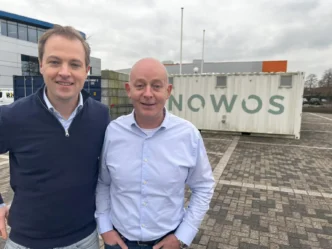Portal Space Systems, a Bothell, Washington-based space startup, has raised $17.5 million in seed funding to fast-track the development of its Supernova spacecraft. A solar-powered propulsion system designed to revolutionize maneuverability in orbit. The funding round, which was oversubscribed, was led by AlleyCorp with participation from Mach33, FUSE, First In, TFX, Offline Ventures, Atypical, and several other strategic backers.
This latest round will support Portal’s first full-scale demonstration of Supernova, with a launch slated for mid-2026.
“Our vision is to provide next-gen spacecraft that today’s space operations demand and our nation deserves,” said CEO Jeff Thornburg. Who is a veteran of SpaceX, Stratolaunch, and Amazon’s Kuiper project. “This funding is a testament to the increasing recognition that maneuverability at will is the critical need in both defense and commercial space operations.”
Portal’s core innovation lies in its solar thermal propulsion system. Which relies on large, lightweight reflectors that concentrate the sun’s energy onto a heat exchanger. That exchanger then heats an ammonia-based propellant, creating high-pressure gas that generates thrust. All without the need to launch a nuclear reactor.
According to the company, this system allows Supernova to move between low Earth orbit and geostationary orbit within hours. A task that could take conventional propulsion systems weeks or even months.
Thornburg emphasized that Supernova offers “the performance of nuclear thermal propulsion without the burden of launching a reactor.”
The system is engineered to meet rising demands for on-demand orbital agility. Especially as the number of satellites in orbit grows and global security concerns escalate.
With the U.S. military increasingly focused on space mobility and resilience. And with growing concerns about orbital threats from rivals like China and Russia. Supernova is being positioned as a critical capability. It’s also expected to support commercial space operations that need faster, more responsive movement across orbital regimes.
Brannon Jones, a former SpaceX engineer now with AlleyCorp, called the spacecraft a “new paradigm of space operations.” He added, “Supernova will improve maneuverability in space by over an order of magnitude. While also significantly extending operational lifespans.”
Mach33, an early investor, doubled down in this round. CEO Aaron Burnett pointed to Thornburg’s track record and the team’s ability to convert technical breakthroughs into customer traction. “That sealed our decision,” Burnett said.
The $17.5 million seed round adds to $2.6 million in pre-seed capital and $5.5 million in SBIR grants, plus a $45 million commitment through the U.S. Space Force’s STRATFI program under SpaceWERX.
Portal now operates out of a newly opened 8,000-square-foot headquarters and development lab in Bothell and is scouting sites for a dedicated manufacturing facility.
The next milestones on Portal’s roadmap include a critical design review and thruster testing. Featuring a 3D-printed heat exchanger — within the next few months. Full system integration is expected by the end of the year, ahead of the planned 2026 launch.
With geopolitical tensions rising and orbital traffic management becoming more complex, Portal’s Supernova may offer a vital leap forward — delivering rapid-response space mobility without relying on legacy propulsion systems.













